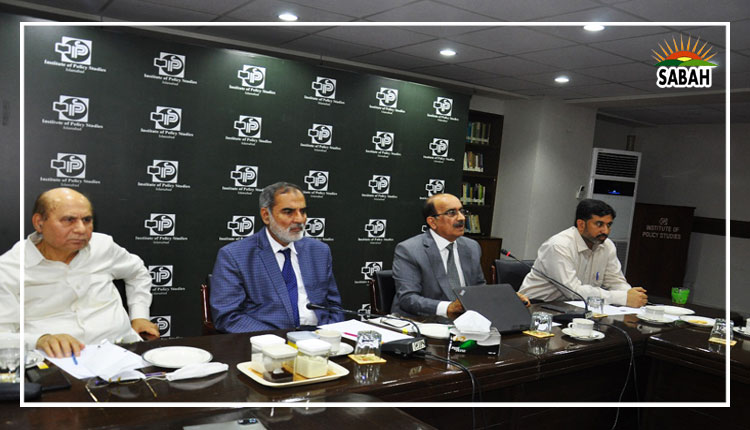IPS initiative to form bridge between policy practitioners & researchers
ISLAMABAD, April 04 (SABAH): There is a pressing need to bridge the gap between public policy and academic research and revolutionize higher education research in Pakistan. The Institute of Policy Studies (IPS), as part of its ‘Promoting & Indigenizing Policy Research Initiative’, aims to form this vital link between policy practitioners and policy researchers.
The inaugural session, titled ‘Brainstorming Research Ideas – Governance and Public Policy’, was held with Dr. Syed Tahir Hijazi, member of IPS’ National Academic Council, eminent academician and policy practitioner, who is leading this project. Present on the occasion were Khalid Rahman, Chairman IPS, Naufil Shahrukh, General Manager Operations IPS, Mirza Hamid Hasan, former federal secretary, and other participants.
The initiative aims to create a countrywide community of policy researchers to address governance issues through research and exchange of ideas. The role of eminent research supervisors in universities is critical for the success of this project. IPS will facilitate the supervisors and research students by providing them complete guidance, connectivity in the policy circles, data, and meaningful insights through a pool of mentors across the country, including retired and serving bureaucrats volunteering for this national cause.
To reap full benefits of this initiative, IPS will take on board all relevant senior academics, government officials, ministers, governance and development consultants, etc. depending upon the focus area – administrative services, economy, finance, internal security, policing, health, education, etc. – to interact with the research supervisors and scholars.
IPS has invited universities throughout the country, especially those interested in carrying out policy-relevant research, to take advantage of the platform to find a senior former or serving policy practitioner. IPS will publish the resulting research work, which will help form a research ecosystem. In this regard, the ministries and government departments can also share their research needs with the think-tank.
Experience has shown that the ministers and bureaucrats mostly don’t have the time or patience to read lengthy reports and prefer a synopsis. Here the media can play a key role in promoting the research ecosystem by converting the research works into bite size reports besides disseminating the key points through social media so that they reach the desired government officials and ministers.
On the occasion, Dr. Hijazi gave a detailed presentation landscaping governance structure and issues in Pakistan.
He was of the view that moral deficit is governance deficit, which is being driven by corruption. Efforts for governance reforms have always failed because the bureaucracy does not want to let go of their privileges. He said governance reforms cannot materialize without the active participation of academia. Governance reforms and research are important keeping in view inefficient governments and corruption.
He said Pakistan is ranked 141 out of 180 countries on the annual Corruption Perceptions Index of Transparency International. However, this situation is purely due to governance issues. According to his compiled data, an estimated Rs 9.5 billion is paid by the public to corrupt government functionaries every day in Pakistan. Systems are so weak that even if a department has honest officers, the lower staff still manage to engage in corrupt practices.
The presentation showed the areas in need of governance reform are government service structure, performance evaluation system, recruitment and selection of government servants, e-governance system, in-service and pre-service training system, transfers postings, tenure, civil establishment code, office procedures, tasks targets goals, compensation and benefits to government servants, police reforms, judicial procedural reforms, judicial law reforms, and pension and retirement benefits.
Speaking on the occasion, Khalid Rahman said this IPS initiative will become an important platform to enhance the role of academia in making Pakistan’s governance and public policy arena better. IPS has been conducting programs under ‘Brainstorming Research Ideas’ for the last five years. The aim is to make research work productive so that it can genuinely benefit policymaking in the country.
He said the fact is that all the research work done in the country has not been able to impact policymaking the way it should have. The policymakers are not interested in lengthy research studies, while the academicians are not playing their due role. There is a need to work on both ends; on one end the researchers and academicians must improve their performance and on the other end they should interact with policymakers so that their work becomes demand-oriented. The latest IPS initiative will be a two-way interaction to engage academia and policymakers in order to make research work useful and relevant.
He said it is generally perceived that Pakistan’s public sector is mostly corrupt as shown by the Corruption Perceptions Index. However, the index does not project the whole picture as it rates countries on the basis of their perceived level of public sector corruption. This does not necessarily mean that the Pakistani society as a whole is corrupt, he added.












